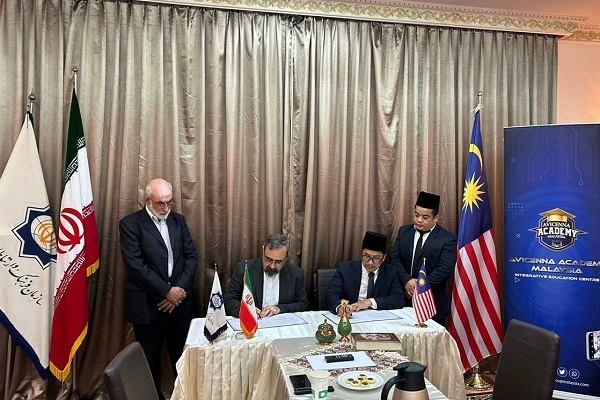AhlulBayt News Agency: The Iranian Cultural Attaché in Malaysia and the Avicenna Academy have signed a memorandum of understanding (MoU) aimed at expanding cooperation in cultural and Islamic medicine fields.
The MoU was signed by Habib-Reza Arzani, Iran's Cultural Attaché in Malaysia, and Muhammad Saifullah bin Yusof, CEO of the Avicenna Academy.
The agreement emphasizes joint efforts to honor the legacy of Avicenna (Ibn Sina) and his significant contributions to science and medicine. It also aims to boost health tourism by inviting Malaysian medical teams to participate in advanced training programs on traditional and Islamic medicine in Iran.
Key provisions of the MoU include organizing collaborative programs with Islamic medicine centers in Iran, conducting joint workshops for scholars and enthusiasts of traditional Iranian and Malaysian medicine, and holding specialized courses in Iran to strengthen health tourism opportunities for Malaysian citizens.
Furthermore, the Avicenna Academy in Malaysia will issue accredited certificates upon completion of training programs. These certifications are recognized by Malaysia's Ministry of Health, ensuring their credibility and value in the medical field.
The collaboration is expected to foster stronger cultural and medical ties between Iran and Malaysia while promoting Avicenna's scientific and philosophical heritage on an international scale.
Who Was Avicenna?
Avicenna (980–1037), also known as Ibn Sina, was a Persian polymath widely regarded as one of the most influential thinkers and scholars of the Islamic Golden Age. Known primarily for his contributions to medicine, philosophy, and science, he authored over 450 works, of which around 240 have survived.
His most famous book, "The Canon of Medicine" (Al-Qanun fi al-Tibb), served as a fundamental medical text in both the Muslim world and Europe for several centuries. It was used as a primary reference in medical schools across Europe well into the 17th century.
Avicenna's works not only advanced medical knowledge but also laid the foundation for modern evidence-based medicine. His contributions extend beyond medicine into philosophy, astronomy, and physics, earning him a lasting legacy as one of the greatest intellectuals in history.
/129
The MoU was signed by Habib-Reza Arzani, Iran's Cultural Attaché in Malaysia, and Muhammad Saifullah bin Yusof, CEO of the Avicenna Academy.
The agreement emphasizes joint efforts to honor the legacy of Avicenna (Ibn Sina) and his significant contributions to science and medicine. It also aims to boost health tourism by inviting Malaysian medical teams to participate in advanced training programs on traditional and Islamic medicine in Iran.
Key provisions of the MoU include organizing collaborative programs with Islamic medicine centers in Iran, conducting joint workshops for scholars and enthusiasts of traditional Iranian and Malaysian medicine, and holding specialized courses in Iran to strengthen health tourism opportunities for Malaysian citizens.
Furthermore, the Avicenna Academy in Malaysia will issue accredited certificates upon completion of training programs. These certifications are recognized by Malaysia's Ministry of Health, ensuring their credibility and value in the medical field.
The collaboration is expected to foster stronger cultural and medical ties between Iran and Malaysia while promoting Avicenna's scientific and philosophical heritage on an international scale.
Who Was Avicenna?
Avicenna (980–1037), also known as Ibn Sina, was a Persian polymath widely regarded as one of the most influential thinkers and scholars of the Islamic Golden Age. Known primarily for his contributions to medicine, philosophy, and science, he authored over 450 works, of which around 240 have survived.
His most famous book, "The Canon of Medicine" (Al-Qanun fi al-Tibb), served as a fundamental medical text in both the Muslim world and Europe for several centuries. It was used as a primary reference in medical schools across Europe well into the 17th century.
Avicenna's works not only advanced medical knowledge but also laid the foundation for modern evidence-based medicine. His contributions extend beyond medicine into philosophy, astronomy, and physics, earning him a lasting legacy as one of the greatest intellectuals in history.
/129

